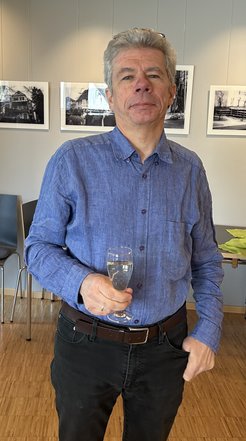“Never in a Tie”
Sociologist Dietrich Oberwittler celebrates 25 years with the Max Planck Society
The renowned German sociologist and criminologist Dietrich Oberwittler is marking a significant milestone—25 years with the Max Planck Society. A leading researcher based at the Max Planck Institute for the Study of Crime, Security and Law in Freiburg im Breisgau, he has spent decades exploring how people perceive safety and security, as well as their fear of crime. To celebrate this anniversary, we are giving the spotlight to those who have had the pleasure of working with him.

“What springs to mind first when I think of Dietrich Oberwittler is a quote that has become a household phrase for me. When I—then totally new to the events scene—once asked him what sort of clothing might be appropriate for a conference we were set to attend the next day, he replied, ‘Never in a tie. People need to be able to recognize you as a sociologist.’ This second part of the remark has since become a much-quoted catchphrase in our household. I think it perfectly captures Dietrich’s likeable and clear stance that speaks volumes about the kind of person he is.”
Tim Lukas, Bergische Universität Wuppertal (former work colleague)
“Dietrich is not just a distinguished sociologist and criminologist, internationally renowned for his expertise. As an esteemed colleague and conversational partner, he is characterized by his listening skills. He always has an open ear. He does not look down on anyone, regardless of their status or position. He is always willing to share his extensive knowledge and experience with others. Even during stressful phases, he remains approachable and committed to helping others. This combination of specialist expertise, approachability, and commitment is something very special.
Dietrich’s research not only contributes significantly to the academic discourse but also promotes an understanding of the multifaceted social dynamics in society. His findings provide a solid foundation for evidence-based approaches to crime prevention and security policy. His voice is therefore a valuable asset to society and enables an objective discussion of public security issues.
For him, science is not a ‘business’, but a true calling. But behind the objective, analytical researcher there is also a sociable, approachable, and authentic person.”
Dina Hummelsheim-Doss, University of Cologne (former work colleague and project partner)
“Dietrich always has an open door and an open ear. It is simply incredible how you can just drop by his office at any time to talk to him, no matter how much stress he is under.”
Florian Kaiser, Max Planck Institute for the Study of Crime, Security and Law (postdoc)
“Dietrich is very caring. I can remember that I had to work with a lot of Excel tables on a small notebook screen during the pandemic. When Dietrich heard about this, he came to my house in person to bring me a work monitor.”
Lisa Natter, Criminological Research Group of the Bavarian Police Force (former doctoral researcher)
“Dietrich is both a brilliant colleague and dear friend, possessing a sharp mind and thoughtful, critical view of society. He effectively integrates theory with empirical data to explain complex issues in a clear manner. I also value his outstanding ability to present advanced statistical models in a way that makes them accessible—an ability few researchers share.”
Robert Svensson, Malmö University (cooperation partner)
“Dietrich’s research focuses on the context of crime and the intersection of people and place. He works across disciplinary boundaries and draws on cutting edge methodologies to better understand the drivers of crime and disorder and to make communities safer.
Dietrich is a rigorous, thoughtful scholar who takes a theoretical, but practically informed approach to his research. He is a wonderful collaborator and colleague who takes an inclusive approach to research practice.”
Rebecca Wickes, Griffith University (project partner in Australia)
“Dietrich embodies what science should be: objective, strong in methodology, and critical in thinking—all of that combined with the required freedom and responsibility.
What sets him apart as a person: a lot of patience and understanding, reliability, and when it really matters, the necessary sense of humor.”
Dominik Gerstner, State Police College of Baden-Württemberg (former colleague)
Since 2019, Dietrich Oberwittler has been in charge of the independent research group Space, Contexts, and Crime that explores the role of spatial effects on crime and perceptions of safety and security. Previously, he led or contributed to several projects on youth crime and violent crime. Since 2015 , he has also been an extraordinary professor at the University of Freiburg.
Oberwittler is considered one of the most renowned criminologists in Germany when it comes to issues in connection with people’s perception of safety and security and their fear of crime.
